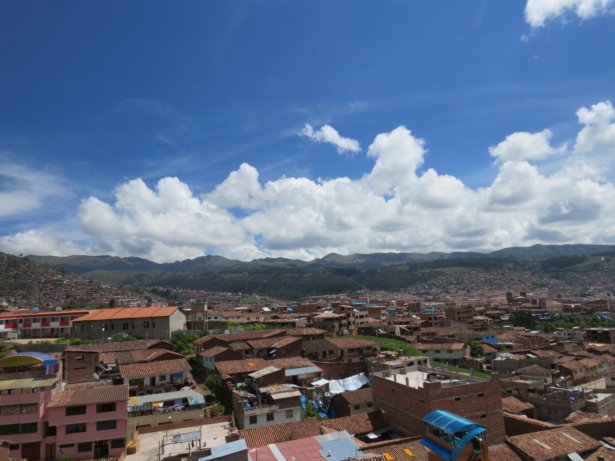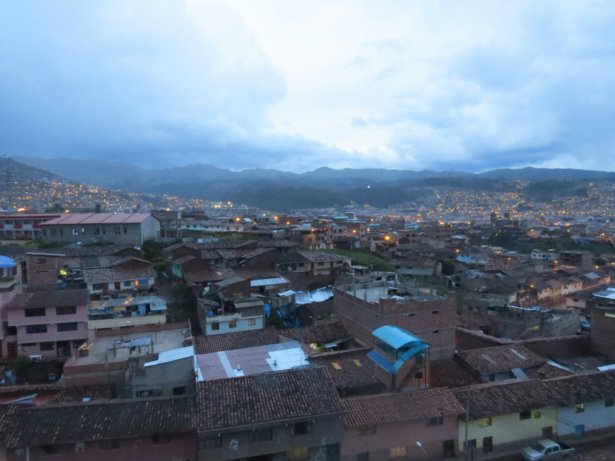Ernesto ‘che’ Guevara, who visited Cusco in 1952 as part of his epic journey up South America, wrote extensively and admiringly of Cusco during his time here, describing it as ‘evocative’.
Based on his writing, I don’t think a huge amount has changed in the look of the city. The once great Incan settlement is still buried beneath newer Spanish tiled roof houses, squares and churches, the mountains still surround it imposingly, and the weather is still predominantly grey. This is not to take away from the beauty of the city. From a high point you can observe a sprawling urban mass. Planning has obviously taken place in the construction, yet because of the hills it seems neighbourhoods have simply sprung up where space was available. Indeed when you venture away from the centre you find poorly built roads, houses crumbling or unfinished (tax on finished buildings means they’re often not completed on purpose), stray dogs everywhere (apparently there are more dogs in Cusco than people) and people urinating where they like. It is in one of these suburbs, up one of the surrounding mountains, that the orphanage is situated. At 7:30am on Wednesday I arrived there, after a 25 hour journey that completely exhausted me to the extent that I slept most of the rest of the day. In the evening me and the other volunteers, 5 guys all from the UK, went to dinner for a birthday and ended up heading into town to the two main pubs in the Plaza de Armas, the main square in the city. Both pubs, one a motorcycle enthusiast’s, one ‘the highest 100% Irish pub in the world’, are evidently for Tourists but have great views over the square and aren’t packed with westerners this time of year.
Our duties at the orphanage mainly revolve around interacting with the orphans at a basic level. Playing with them, playing football, playing on our tablets and iphones with them, watching TV, sometimes eating with them. This is kind of day to day stuff, where we might do stuff 10-12, then 2-5. However sometimes, if they’re free and we’ve got an idea, we can take them swimming, or put on shows or competitions. Today it was a big festival in the city and most of the volunteers went to the pubs to watch the football and get some food. However this festival is one based around water bombs and silly string sprays, and there was no way we were not going to get involved. When we split off to look for a Spanish school, me and one of the other guys kept on getting ambushed, so decided to fight back buy getting equipment of our own and joining in the, massive battle in the centre of the Plaza de Armas. Much fun was had, but on the way back we met a large gang of the orphans skulking around the streets near the orphanage. Using our remaining water bombs we engaged them and everyone got completely soaked. After that we helped them fight other kids on the streets, which they loved.
It feels like our primary role with them is just to be there and give attention and the feeling that they’re loved. Obviously it could be more organised and we could have more official duties, but this does feel like it works, depending on the effort you put in.
There’s also a lot of free time and time for travel. You’re allowed to travel wherever you like during your time here (doing so you’d still have to pay for accommodation) and many volunteers go down to Lake Titicaca and sometimes further afield. I don’t know where I’ll go yet, or when, or more importantly, when I’ll go to Macchu Picchu, but for the time being I’m going to try to find a good Spanish school with Salsa AMD cooking lessons included, and maybe a gym. Because I’ve been eating too much and not really working it off, although the altitude does punish you in the first few days.
Guevara writes a long and detailed history of the city which I can’t really comment on at the moment as I haven’t been to any museums yet. I would recommend reading his book though, as he writes really well and the section on Cusco is brilliant. As a basic outline though, in Inca Mythology someone called Mama Oclo into the soil at the site of the city and it sank, signifying this as the place selected by their main god, Viracocha, to be the home of his chosen people. From here Incans built a glorious city and expanded outwards, building an empire from Ecuador to Chile, becoming the greatest and largest ancient civilisation of the Americas. However it was not to last. When Spanish conquistadors arrived in the 16th century, their thirst for the riches of the Incas brought them to the capital, and it was, despite previous surrender, sacked unceremoniously. Much of the gold that once adorned the temples and palaces of Cusco disappeared back to Spain or went to Lima, which grew to prominence as an transit port for the Spanish. Despite this fall from grace, Cusco still retains a regal, imperious quality. As Guevara states, even if it had no history whatsoever, it would still attract people drawn to its location and architecture. However it inescapably feels like a city once the centre of a civilisation.
Some of the dignity that the Incans held has been lost by modern day Peru (although it’s more likely the fault of globalisation than anything else). Watching TV can be hugely entertaining. The most popular show is Gladiators cum Big Brother, with attractive guys and Girls who look anything but Peruvian (I expect they’re Argentinian). Watching it is incredibly dull. They play the same games in low budget sets for far too long and do it over and over again, day after day. The people are devoid of personality, romances are obviously scripted, and for some reason the Silver team always wins. So basically it sounds like half the shows on British TV I guess. There are also continual adverts for growth hormones from unconvincing doctors attempting to make a profit of the small stature of these people. One plus point is there are loads of movies on normal TV, good ones too, but if you finish it, it becomes obvious its just a guy changing DVDs when he feels like it, which can sometimes be hours after a film has finished.
But who am I to judge? Cusco is remarkable because despite the apparent poverty of many of its civilians, there is virtually no violent crime, and many people are quite friendly.
Hopefully my next update will be after some Spanish lessons and some treks.
Hasta lluego






great to hear about Cusco. Some pictures please!
Enjoying reading about everything you’ve been doing – sounds brilliant!